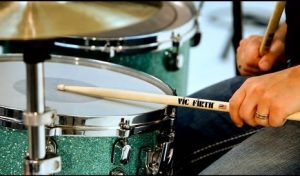A homily for the Second Sunday of Advent 2019, from the Gospel of Matthew 3:1-12
A lady goes to the doctor because her shoulder hurts.
“Does it hurt all the time?” the doctor asks.
“No, just when I do this,” she says, flapping her elbow like a chicken wing.
“Then don’t do that.”
 Rimshot, please.
Rimshot, please.
OK, it’s an old joke, but it shines a lot of light on today’s Gospel.
John, the cousin of Jesus, the wild-eyed man living in the desert, wearing Fred Flintstone furs and eating bugs, is calling on people to repent, and baptizing them in the scuzzy river water.
And people are coming from all over, walking miles to see this prophet and get themselves clean. Spiritually clean. Because their souls are sick; their hearts and consciences are in pain. And this ritual washing is the cure.
But in every act of repentance, there’s a promise, a promise that makes this cleansing and healing possible.
“I won’t do that anymore.”
There’s no sense in getting clean if you’re going to roll around in the mud again.
In Scripture, descriptions of encounters with The Baptist are vivid; he clearly is the fulfillment of the prophet Isaiah’s expectation of a voice crying out in the wilderness. He is gruff, rough around the edges, and loud.
Elsewhere in the Gospels, Jesus gently forgives trespasses and asks people to go and sin no more. John, on the other hand, is fire and brimstone and “Repent! Repent!” His baptism in itself implies – loudly – that people should go and sin no more.
And if we’re talking loud and gruff, listen again to the insult he shoots at the religious leaders of the Jewish community:
“You brood of vipers! … the chaff – meaning all of you Pharisees and Sadducees – he will burn with unquenchable fire.”
John lays a smackdown on the holiest men, the most powerful men in town. To him, they’re snakes in the grass, slithering on their bellies, waiting to strike if somebody crosses their path. If somebody strays from the path they say is the right one to follow.
To John, they’re the stems and stalks and garbage left over from the harvest, the harvest that symbolizes the people of God who let The Word grow in their hearts.
“You brood of vipers! Who warned you to flee from the coming wrath? Produce good fruit as evidence of your repentance.”
As we listen again to John, as we imagine him waving his arms and shaking his fists at these men who surely were dressed in fine clothes and jewelry and who likely were recognizable from blocks away, there’s an anger that’s, frankly, scary. That seems so un-Christlike.
The coming wrath? That seems out of sync with the love of God through Christ, and definitely doesn’t sync with how we believe we should be living today.
No, it smacks of Noah and the flood, or Sodom and Gomorrah and Lot’s wife turning into a pillar of salt.
But producing good fruit? That’s in tune.
We’ll come back to that in a second.
Now, just a quick refresher on the Pharisees and Sadducees.
Throughout history, the Jewish people have been guided by what’s popularly known as The Law and The Prophets – the commandments sent by God through Moses, and the detailed rules for living as catalogued in the books of Deuteronomy and Leviticus, alongside the preaching of men such as Elijah, Samuel, Jeremiah and Isaiah, who spoke eye-opening truth to human power, whether the people wanted to hear it or not.
The Pharisees embraced both the law and the prophets; Sadducees, the law.
By the time of Jesus, though, both groups were showing devotion to the letter and not the spirit of the law.
All head, no heart.
Which is why the Gospels portray John first and then Jesus as chastising Israel’s leaders for being rigid, for lacking charity and mercy and compassion. For saying the rules are the rules are the rules, and they must be obeyed 100 percent. Without question or thought.
Which is why John first and then Jesus are the radical counterparts, the disruptors who know that people sometimes commit sins, and that when they do, and then when they seek forgiveness, they should receive it.
As long as they promise they won’t do that anymore. Or try their hardest not to.
People then, people now need to be busy. It’s in our nature. The whole idle hands, devil’s workshop thing.
So when people repent for having strayed from the way God wants them to live, and promise not to do that again, whatever “that” was, then folks need something better to do. This is where heart comes in.
If someone is atoning for a specific sin, especially one that affected someone else directly, then the heart calls out for repairs or restitution. As Jesus said, make peace with your brother and then bring your offerings to God together.
If the trespass had a different impact, then the penance could be an act of justice or charity for the greater good.
Best yet, though, is not being transactional. Not “paying for your sins” on a one-to-one basis, the way you wipe up spilled grape juice with the quicker picker-upper.
Best yet is to live a life guided by Christ, strengthened by his Spirit, in which you produce good fruit, in which you strive to be the best you that you can be, and when you slip up – because we all do – when you slip up, you apologize to our merciful God, and then say …
“I won’t do that again.”
